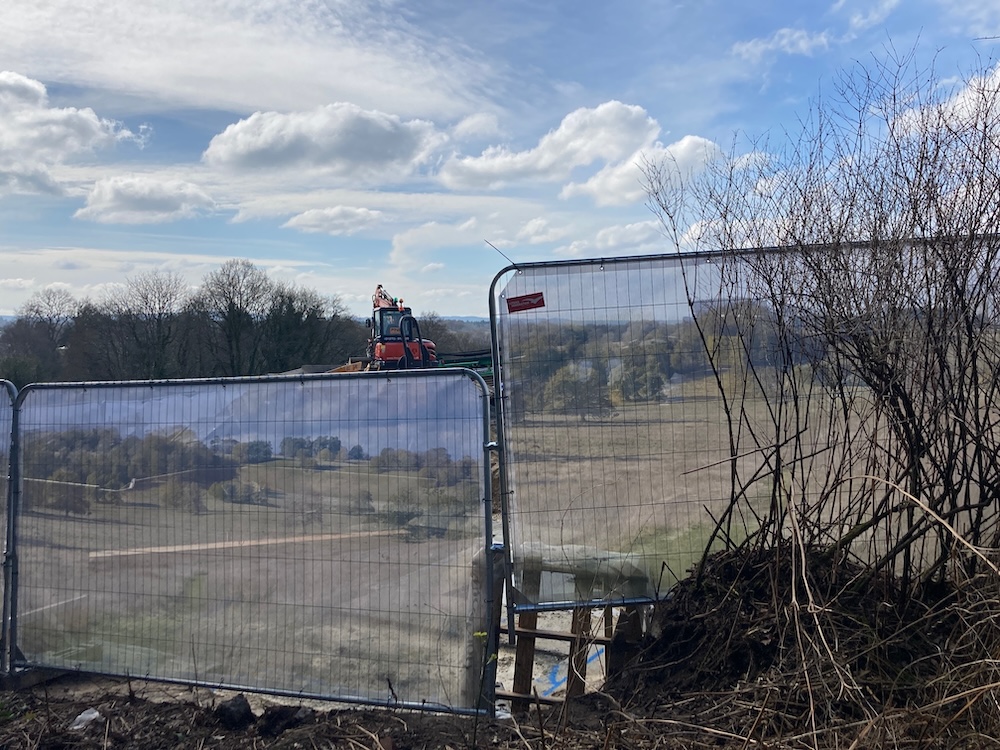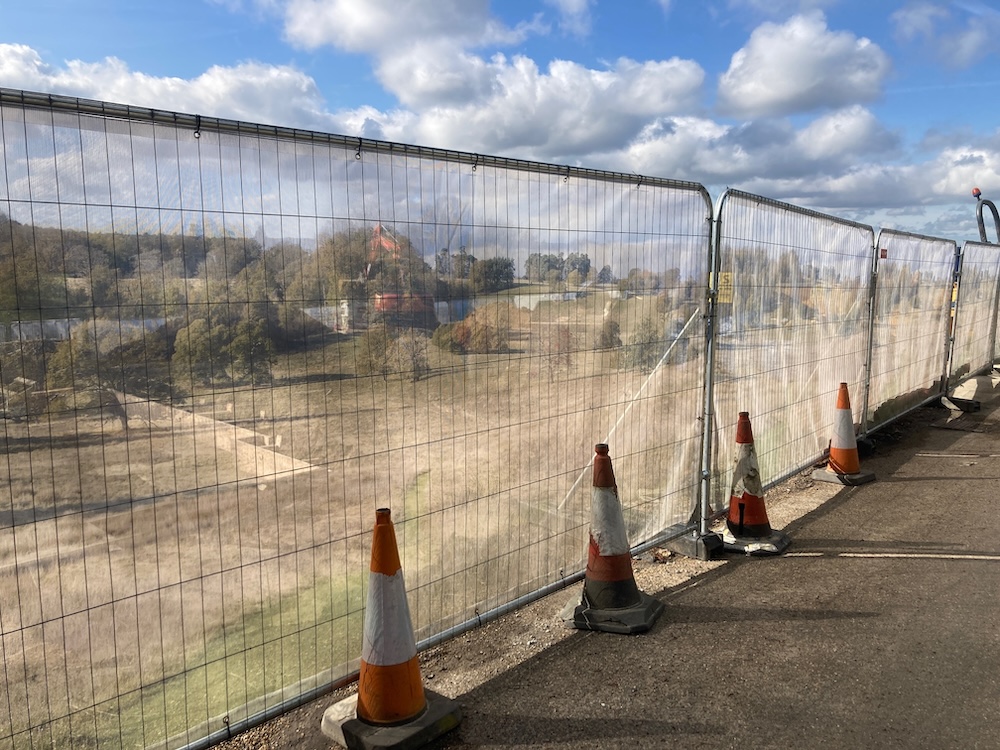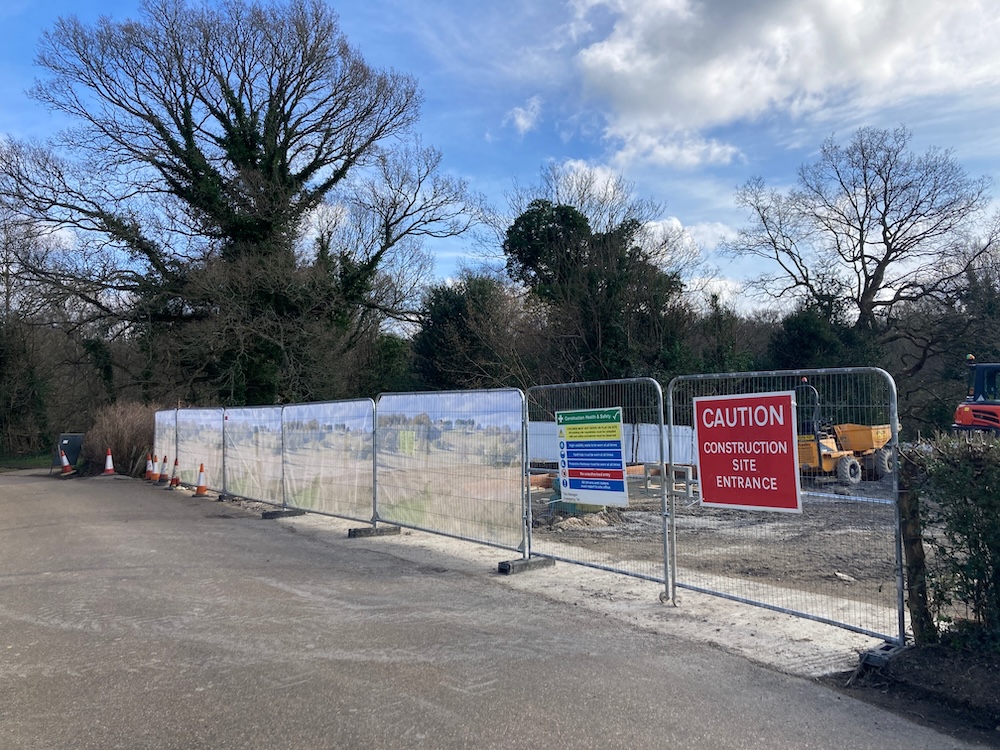The idea of Albion has inspired poets and dreamers for centuries. But is any of it real? Mark Hooper can’t see the wood for the trees…

I came across a curious sight on my regular weekend walk recently. I had just passed through a gateway onto a privately owned road (aka ‘the posh road’), which commands sweeping views from a ridge over the Kent/Sussex borderlands that most locals can only afford to admire from afar.
But this time, I was confronted by a building site. The dilapidated old gatehouse that had stood at the entrance to the road had been demolished, and the construction company were busy laying foundations for a new building. Usually, this would have been an eyesore. But, not wishing to deny us the vista we’d come to enjoy, the builders had thoughtfully erected screens made of a gauze material to obscure the heavy machinery lurking behind. On these screens, they had printed a super hi-res, lifesize image of the view beyond. The result was that, if you stood at the correct angle, you could still admire the valley below and the distant woodland.
Take a few steps further on and look at the screens from the wrong direction, however, and the artifice was revealed. The countryside was a façade.
As I continued walking, it got me thinking. A kindly landowner had gone out of his way to show us the landscape we’d come to see. It was a nice metaphor for the British landscape as a whole, where the 1% deny us access to the countryside we like to pretend belongs to all of us. In truth, the public in England have the right to roam over a mere 8% of the country* (legally defined as ‘open access’ land). So wasn’t the actual landscape obscured by the screens also a façade? There is an idealised notion of rural England — this unreachable Albion of rolling lush trees, meadows and forests. But it is unreachable not just because Albion is a poetic fantasy of perfection, but also — in purely practical terms — because the landowners like it that way.

Despite what we want to believe, most of the modern British countryside is a construct: one that has been shaped by private ownership since the feudalist Middle Ages, while the Enclosures Acts of 300 years ago divided previously common land into patchwork patterns, separated by hedgerows. And, whilst they might look quaint, the hedges may just as well have large ‘Keep Out’ signs hanging from them. Notwithstanding a few protected ancient woods, most of what we think of today as ‘wild’ has been shaped by humans. Woodland has been decimated by the demands of shipbuilding, construction and charcoal burning. Valleys have been flooded to create lakes for hydro-power plants or for leisure. Marshland has been drained. Hills have been cut through, rivers have been rerouted. It’s this manmade playground that we now feel we should preserve. (Even the forests never belonged to us common folk — the word ‘forest’ itself originally meant land set aside for hunting by the king.)
It was ever thus: the rich, powerful, white and male landowners have always limited access to the nation’s countryside. The fact that this has recently been exacerbated by ‘culture war’ ideologists has only encouraged the disenfranchised to unite through a common aim. It’s heartening to see diverse groups — including the brilliantly named We Go Outside Too, alongside Flock Together, Athene Club, ClimbMuz, ESEA Outdoors and more — deepening the ‘right to roam’ remit. By the simple act of walking, they are helping to reclaim the countryside for us all — rekindling the Kinder Scout spirit.
Recently, I found myself talking about walking with Stephen Cracknell, founder of The Memory Band, at the PopUp Stroud: NeoAncients festival. It was fascinating to see how my half-formed thoughts chimed with what so many of the participants were also talking about. People like Zakia Sewell, Jeremy Deller, Jarvis Cocker and Stephen Ellcock. There’s definitely something in the air, wrapped up with what it means to be British in the 21st century, and a desire to “take our country back” in a very different way to the Faragists.
But amidst all the “Make Walking Radical Again” polemics, Stephen was there with the sardonic voice of reason, as ever. Maybe we need to move away from talking about what it means to be British, and look at the bigger picture. Maybe we need to stop romanticising nature, and step back from the Victorian revivalism of Albion. Yes, there is a healing power in nature, but the natural world is also a dangerous place that we have gradually tamed so that is no longer home to things that might kill us, from boars to highwaymen. Yes, there may be secret, partly unknown paths that are worth treading again — like Alfred Watkins’ leylines, that he famously saw as an apparition across the landscape, ‘like glowing wires all over the surface of the country’. But Stephen was quick to warn of falling for the “false epiphanies” that walkers, poets and dreamers have experienced over the centuries. (“Tiredness and blood sugar levels play a part — and sometimes psychedelic enhancers.”)

Maybe it’s truer to say we all just want to access our idea of nature, much of which is based on wishful thinking and whimsy. And there’s nothing wrong with that. The reality may be that it’s all a façade, and we’re better off staring at printed screens of it after all. Anyway, Stephen and I are off for a walk soon. More of which to come…
*NB: There is a sharp distinction with Scotland, where the Land Reform Act 2003 recognises a ‘freedom to roam’ across nearly all land.